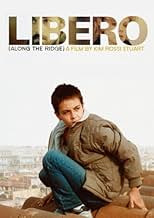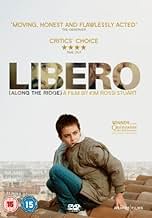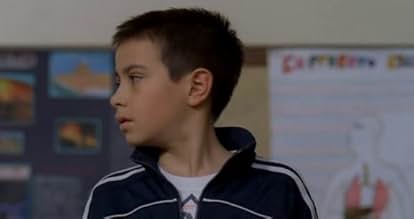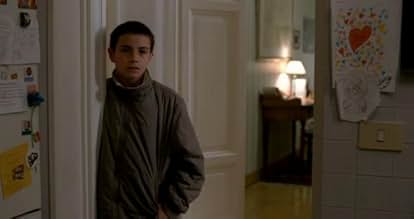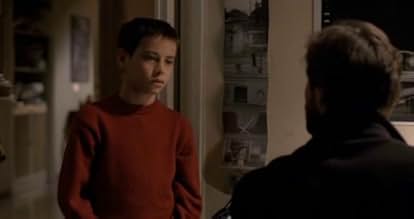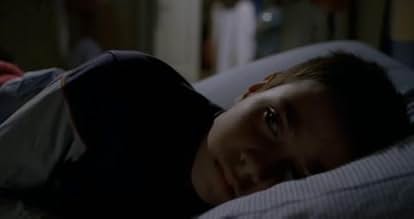IMDb-BEWERTUNG
7,4/10
2716
IHRE BEWERTUNG
Füge eine Handlung in deiner Sprache hinzuA young father and his two children struggle to find harmony after his wife leaves them for another man.A young father and his two children struggle to find harmony after his wife leaves them for another man.A young father and his two children struggle to find harmony after his wife leaves them for another man.
- Auszeichnungen
- 21 Gewinne & 19 Nominierungen insgesamt
Sebastiano Busiri Vici
- Barzelli
- (as Sebastiano Busirivici)
Empfohlene Bewertungen
This movie was re-released in Pathe theatres, Amsterdam as part of the Summer Films special screening. I read very good reviews of it and was interested to see it. Even if did not turn out to be what the reviews say (that happens quite often) I would had been fine.
The story is shown through the eyes of 11 year old boy Tommi (Alessandro Morace), who stays in an urban lower middle class dis-jointed family with his unemployed cameraman father Renato (Kim Rossi Stuart) and sister Viola (Marta Nobili). His mother Stefania (Barbora Bobulova) has left the family for some other man. Even in the dis-functional family where it is difficult to meet expenses and ends, Renato with all his frustrations, still loves the kids a lot. Parallel to this are two sub-plot running one, where Renato wants his son Tommi to be a swimmer, whereas Tommi wants to become a football player. Second, the school life of Tommi where he tries to seek friendship and love with his classmates. When Stefania suddenly appears one day out of no where back to the family after a bit of test and trials there is hope, happiness in the family. But again suddenly she disappears and leaves behind the traumatic family in despair.
This is the first time directorial debut of the very good looking famous Italian actor Kim Rossi Stuart. After his long acting career he does great justice to his new role as a Director. I read that he was not suppose to act in this movie, and only direct the movie; but just 15 days before the shooting when the selected actor left the movie, the producers persuaded Kim to take the role of the father. Kim looks stunning, very pleasing to the eyes and has acted efficiently well. I think after a long time, I personally have seen some real good looks on screen. But I will leave it on girls and women to add more.
But the movie belongs wholly and solely to Alessandro Morace. First movie and he lives the role of Tommi as no other kid could have ever done justly. He shows all the range of emotions so naturally as if this role was written keeping him in mind. He is magnificent. Equally good in their small roles are Marta Nobili and Barbora Babulova.
In the beginning 15 minutes of the movie Director / actor Kim sets the tone by exposing to audience scenes that would make the point of what to expect from the movie so people are not deceived into any flamboyant commercial stuff.
This movie is jointly written by four writers with Kim being one of them. There are so many numerous scenes in the movie that make you feel oh alas, I hope I was part of this family and character. They are so wonderfully filmed. The touching moments moist your eyes and linger with you even after the movie is over.
Good music, good editing, good cinematography! Great cinema! Well done. If I had not gone to see this I would had missed a gem.
(Stars 7.75 out of 10)
The story is shown through the eyes of 11 year old boy Tommi (Alessandro Morace), who stays in an urban lower middle class dis-jointed family with his unemployed cameraman father Renato (Kim Rossi Stuart) and sister Viola (Marta Nobili). His mother Stefania (Barbora Bobulova) has left the family for some other man. Even in the dis-functional family where it is difficult to meet expenses and ends, Renato with all his frustrations, still loves the kids a lot. Parallel to this are two sub-plot running one, where Renato wants his son Tommi to be a swimmer, whereas Tommi wants to become a football player. Second, the school life of Tommi where he tries to seek friendship and love with his classmates. When Stefania suddenly appears one day out of no where back to the family after a bit of test and trials there is hope, happiness in the family. But again suddenly she disappears and leaves behind the traumatic family in despair.
This is the first time directorial debut of the very good looking famous Italian actor Kim Rossi Stuart. After his long acting career he does great justice to his new role as a Director. I read that he was not suppose to act in this movie, and only direct the movie; but just 15 days before the shooting when the selected actor left the movie, the producers persuaded Kim to take the role of the father. Kim looks stunning, very pleasing to the eyes and has acted efficiently well. I think after a long time, I personally have seen some real good looks on screen. But I will leave it on girls and women to add more.
But the movie belongs wholly and solely to Alessandro Morace. First movie and he lives the role of Tommi as no other kid could have ever done justly. He shows all the range of emotions so naturally as if this role was written keeping him in mind. He is magnificent. Equally good in their small roles are Marta Nobili and Barbora Babulova.
In the beginning 15 minutes of the movie Director / actor Kim sets the tone by exposing to audience scenes that would make the point of what to expect from the movie so people are not deceived into any flamboyant commercial stuff.
This movie is jointly written by four writers with Kim being one of them. There are so many numerous scenes in the movie that make you feel oh alas, I hope I was part of this family and character. They are so wonderfully filmed. The touching moments moist your eyes and linger with you even after the movie is over.
Good music, good editing, good cinematography! Great cinema! Well done. If I had not gone to see this I would had missed a gem.
(Stars 7.75 out of 10)
Tommi, 11 years old, lives with his older sister Viola and his father Renato. At the beginning of the film we don't know where Stefania, their mother, is; but she appears again, and, even we came to know that in the past she hasn't been able to stay in the family and grow up her children, this time it seems she came to stay. Viola is happy, Tommi is more skeptical. Time will tell who was right. "Libero" is a defensive soccer player who doesn't have a specific opponent; Tommi, who is a very good swimmer but doesn't like to swim, at the end of the film says "Anche libero va bene" ("Even libero is OK"), when finally his father agrees to send him to a soccer school, even he'd better be a midfielder. This is a difficult film, dealing with the over-discussed family subject in an ordinary, but still very different way, aided by a superb interpretation of all the four leading characters, with a special mention for the first-time-on-screen Alessandro Morace as Tommi. Barbora Bobulova could be the best Italian actress if she was born in Italy (but we adopt her with great pleasure), and Kim Rossi Stuart, for his debut as director, is also convincing as Renato, even if he had to substitute at the last moment Sergio Rubini, who was the original choice. Probably the best Italian film of 2006.
I recently saw this at the 2007 Palm Springs International Film Festival and of the 31 films I saw there this film makes my top six. Actor Kim Rossi Stuart makes an impressive directorial debut with this film. Stuart began his acting career as a child actor and probably from that experience he gets the most from his two young actors in the principal cast who are making their acting debuts on film. Stuart casts himself as Renato who is a single father raising a son, Tommi (Allessandro Morace) and a daughter, Viola (Marta Nobili). This is a macho dominated family unit with all the pressure put on Tommi from his father Renato who wants to live his own childhood through Tommi and dominates and supersedes Tommi's own ambitions. Sister Viola kind of gets a free pass to skate through life from Renato. We soon learn that the children's mother Stefania (Barbora Bobulova) is very much alive as she repentantly returns to ask to be once again accepted into the household. She apparently has a history of extra-marital affairs but again in the macho society of this film there is no contesting child custody or the home to live in on her part. Renato has the ultimate say if she can stay or leave and the home and children are his. Both parents obviously love their children but both have emotional problems. Stefania as the straying mother and housewife and Renato who is a fun and creative guy but his broken marriage eats at him and he flares up at the children but also lovingly plays around with them like a kid himself. His do-it-my-way attitude spills out to his work environment also as a freelance film cameraman and causes further problems for him. The title Along the Ridge comes from the building rooftop where Tommi keeps a secret hiding place precariously perched at the edge of a steep roof high above the street below. Good story from Linda Ferri, Francesco Giammusso, Federic Starnone and Stuart with excellent cinematography from Stefano Falivene. I would give this an 8.5 out of 10 and recommend it.
Through a look at the life of a crumbling lower middle class family in Rome, first-time director Kim Stuart Rossi takes a surprisingly honest look at a number of issues, like divorce, and the role of males in contemporary Western European society. The movie is true to life in the best sense: the characters are very similar to people you know. Rossi Stuart also stars in the movie, playing a single father, living precariously as a cameraman, and having to take care of a young son and a teenage daughter (his irresponsible wife is in and out of the house, as the son explains to a rich neighbor and friend). The movie is shown through the eyes of the shy son, but I think the real protagonist is the father, a great dramatic creation of actor-director Rossi. He is a man with an explosive temper, always getting into trouble and thinking the whole world is against him, but he is not a bad person per se; it's just that his hyper masculine values seem to hold less and less value in today's society. Barbora Bolubova, playing the troubled wife, is also very fine. The end is a bit despairing, though as he says in the end, he has been down before, but has always bounced back.
Italian title: 'Anche libero va bene' ('Sweeper's okay too').
Kim Rossi Stewart is a well known actor in Italy. Recent notable performances: 'Criminal Romance' (2005, Michele Placido), 'The House Keys' (2004. Gianni Ameliio). In this, his superb directorial debut, the subject is childhood and dysfunctional families. It's a difficult one to deal with in a fresh way, perhaps. But the situation of newly free-lancing photographer Renato (Stewart), his 11-year-old son, Tommaso/Tommi (Alessandro Morace), and Tommi's older sister Viola (Marta Nobili) does emerge as different, yet true to life. Tommi, the main character, is a somber boy, shy and quiet, a good swimmer. Viola is the bright light in the house, a cheerful soul. It seems Renato is a single father, and a troubled one. He's a photographer without much work, in financial difficulties, a rageaholic, borderline bipolar, who often screams at the two children over little foul-ups in the house.
Then one day the wife and mother of the family, Stefania (Barbora Bobulova), turns up, tearful, cowed, terrified of Renato's rage. She comes and goes, we learn, remaining, apparently, unable to be faithful to one man and also involved with a rich guy. Renato is very reluctant to take her back. He also inappropriately involves the kids in the decision about this, and lets them hear the foul words he applies to his wife.
As time passes Renato becomes more emotionally stable at home with Stefania around, though he seems unable to cooperate on a job, trying to tell the director to photograph a camel when he needs a shot of a car, then walking off the set, and already having cut off his former employers.
Tommi is the realistic one. He knows Stefania will leave again, and hence finds it hard to give her affection. His freedom is to go up on the roof and look down through a pair of binoculars. This is his refuge. He has a friend now, Antonio, son of rich neighbors. He takes Antonio up to share the roof with him. Tommi dominates the film with his sad eyes in an impassive face. His heart seems to threaten to become frozen, and sometimes when it opens, it quickly shuts again. Despite too much pushing from his father, he still does well in swimming, though it never seems as if he cares. In class he chooses to stay seated next to Claudio, a new boy who has reacted to the trauma of his father's death by becoming mute. Tommi writes "I love you" to a girl he's next to in ceramics class, but when she finds the note, denies that he had anything to do with it.
Stewart gets excellent acting from everyone, most remarkably from young Morace, who doesn't seem "actor-y" at all but completely genuine. The direction in other ways is not as inventive or fresh as it could have been. The camera-work is mechanical in following people around. But the deeply touching story makes that unimportant.
One gets a strongly particular sense of the family here, of its instability and sadness, especially Tommi's; the film seems to have less ability to open itself up to the outside world and show the characters' relationship to it, in spite of scenes at Tommi's class at middle school.
After Ranato's rejection of Tommi for giving up the swim team, a contrast comes when his friend Antonio's father invites him to go fishing, just the two of them, Antionio being in Naples with his grandmother for the day, and Tommi has dinner with Antonio's family to share the fish they catch. This father isn't judgmental but helpful, and the family is a serene and happy one.
As always it is disturbing to see children being subjected to a family life that is only wounding them, and which they will at best survive. Things are particularly bad when Tommi drops out of a swim match and finally declares he doesn't want to swim any more (we know he always preferred to play football). "Who gives a damn!" Renato declares. You;'re no son of mine." What a child needs is first for both parents to be present in their life and second to have unconditional love and support. They often don't get either. 'Along the Ridge' is courageous in showing parents who fail and a child who somehow manages to deal with that.
As things get worse for Renato, Tommi's life takes on a tragic dimension and the film gains some of the resonance of the great Italian neorealist films. Those who've grown up in a dysfunctional family will understand the cold comfort Tommi feels escaping from his father's meltdown on a ski trip with Antonio and his cheerful, decent parents. The title in Italian refers to a reconciliation between Tommi and his dad. He's going to let Tommi play football after all ad the position Tommi favors is midfielder, but dad likes sweeper. "Sweeper's okay too," says Tommi. In context, it's a line that will make you weep.
Shown as part of the San Francisco International Film Festival 2007.
Kim Rossi Stewart is a well known actor in Italy. Recent notable performances: 'Criminal Romance' (2005, Michele Placido), 'The House Keys' (2004. Gianni Ameliio). In this, his superb directorial debut, the subject is childhood and dysfunctional families. It's a difficult one to deal with in a fresh way, perhaps. But the situation of newly free-lancing photographer Renato (Stewart), his 11-year-old son, Tommaso/Tommi (Alessandro Morace), and Tommi's older sister Viola (Marta Nobili) does emerge as different, yet true to life. Tommi, the main character, is a somber boy, shy and quiet, a good swimmer. Viola is the bright light in the house, a cheerful soul. It seems Renato is a single father, and a troubled one. He's a photographer without much work, in financial difficulties, a rageaholic, borderline bipolar, who often screams at the two children over little foul-ups in the house.
Then one day the wife and mother of the family, Stefania (Barbora Bobulova), turns up, tearful, cowed, terrified of Renato's rage. She comes and goes, we learn, remaining, apparently, unable to be faithful to one man and also involved with a rich guy. Renato is very reluctant to take her back. He also inappropriately involves the kids in the decision about this, and lets them hear the foul words he applies to his wife.
As time passes Renato becomes more emotionally stable at home with Stefania around, though he seems unable to cooperate on a job, trying to tell the director to photograph a camel when he needs a shot of a car, then walking off the set, and already having cut off his former employers.
Tommi is the realistic one. He knows Stefania will leave again, and hence finds it hard to give her affection. His freedom is to go up on the roof and look down through a pair of binoculars. This is his refuge. He has a friend now, Antonio, son of rich neighbors. He takes Antonio up to share the roof with him. Tommi dominates the film with his sad eyes in an impassive face. His heart seems to threaten to become frozen, and sometimes when it opens, it quickly shuts again. Despite too much pushing from his father, he still does well in swimming, though it never seems as if he cares. In class he chooses to stay seated next to Claudio, a new boy who has reacted to the trauma of his father's death by becoming mute. Tommi writes "I love you" to a girl he's next to in ceramics class, but when she finds the note, denies that he had anything to do with it.
Stewart gets excellent acting from everyone, most remarkably from young Morace, who doesn't seem "actor-y" at all but completely genuine. The direction in other ways is not as inventive or fresh as it could have been. The camera-work is mechanical in following people around. But the deeply touching story makes that unimportant.
One gets a strongly particular sense of the family here, of its instability and sadness, especially Tommi's; the film seems to have less ability to open itself up to the outside world and show the characters' relationship to it, in spite of scenes at Tommi's class at middle school.
After Ranato's rejection of Tommi for giving up the swim team, a contrast comes when his friend Antonio's father invites him to go fishing, just the two of them, Antionio being in Naples with his grandmother for the day, and Tommi has dinner with Antonio's family to share the fish they catch. This father isn't judgmental but helpful, and the family is a serene and happy one.
As always it is disturbing to see children being subjected to a family life that is only wounding them, and which they will at best survive. Things are particularly bad when Tommi drops out of a swim match and finally declares he doesn't want to swim any more (we know he always preferred to play football). "Who gives a damn!" Renato declares. You;'re no son of mine." What a child needs is first for both parents to be present in their life and second to have unconditional love and support. They often don't get either. 'Along the Ridge' is courageous in showing parents who fail and a child who somehow manages to deal with that.
As things get worse for Renato, Tommi's life takes on a tragic dimension and the film gains some of the resonance of the great Italian neorealist films. Those who've grown up in a dysfunctional family will understand the cold comfort Tommi feels escaping from his father's meltdown on a ski trip with Antonio and his cheerful, decent parents. The title in Italian refers to a reconciliation between Tommi and his dad. He's going to let Tommi play football after all ad the position Tommi favors is midfielder, but dad likes sweeper. "Sweeper's okay too," says Tommi. In context, it's a line that will make you weep.
Shown as part of the San Francisco International Film Festival 2007.
Wusstest du schon
- WissenswertesKim Rossi Stuart declared that he didn't want to play a role in this film because he wanted to concentrate on directing. But when the actor who was supposed to play Renato (Sergio Rubini) walked out two weeks before shooting, the producers pressed him to play this role himself.
Top-Auswahl
Melde dich zum Bewerten an und greife auf die Watchlist für personalisierte Empfehlungen zu.
- How long is Anche libero va bene?Powered by Alexa
Details
Box Office
- Weltweiter Bruttoertrag
- 1.959.897 $
- Laufzeit1 Stunde 48 Minuten
- Farbe
- Sound-Mix
- Seitenverhältnis
- 1.85 : 1
Zu dieser Seite beitragen
Bearbeitung vorschlagen oder fehlenden Inhalt hinzufügen

Oberste Lücke
By what name was Schwimmen mochte ich noch nie (2006) officially released in India in English?
Antwort
![Trailer [OV] ansehen](https://m.media-amazon.com/images/M/MV5BYzMxODQxZmQtYTNlOC00MmE0LTk4YTItNTU4MGQwYjQ3NDAwXkEyXkFqcGdeQXRyYW5zY29kZS13b3JrZmxvdw@@._V1_QL75_UY281_CR31)
